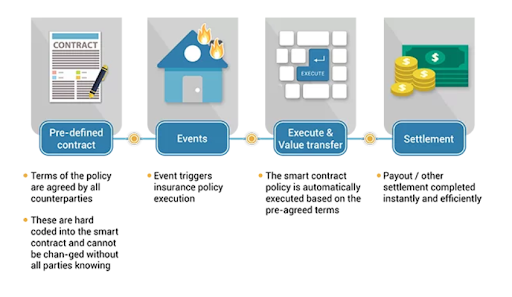Digital programs known as smart contracts are kept on blockchain networks. These contracts are automatically performed upon the fulfillment of the preset terms and conditions. It's a simple idea with significant ramifications. As more individuals become aware of the enormous potential of smart contract technology, the number of smart contract use cases increases every day.
Why Are Smart Contracts Useful?
Smart contracts are beneficial in a variety of situations due to their many advantages and benefits. Let's look into the important advantages of smart contracts:
1) Automation:
Smart contracts execute contractual terms and obligations automatically, negating the need for human participation. This automation lessens human error, expedites procedures, and boosts productivity.
2) Trust and Transparency:
Smart contracts run on decentralized blockchain networks, where contracts are executed, and transactions are recorded for everyone to see. This transparency fosters more confidence by eliminating the need to rely on a centralized authority or middlemen.
3) Security & Immutability:
A smart contract becomes tamper-proof and immutable once it is implemented on a blockchain. With several nodes storing the contract's code and execution history, it is extremely safe against fraud and unauthorized changes.
4) Time Efficiency:
Smart contracts can speed up procedures that often take a lot of manual work and time by automating contract execution. This speed can be especially useful for deals and agreements that must be completed quickly.
5) Elimination of Counterparty Risk:
By only executing predetermined actions when certain criteria are met, smart contracts eliminate the risk of a third party breaching a contract. As a result, counterparty risk is decreased, and there is certainty that the terms of the contract shall be enforceable.
6) Innovation and New Business Models:
Smart contracts present opportunities for novel business strategies and inventive uses. They promote innovation and disruption in a variety of industries by enabling the development of decentralized apps (DApps) and decentralized autonomous organizations (DAOs).
Use Cases of Smart Contract
Financial Use Cases for Smart Contracts
Decentralized finance (DeFi) dApps are a strong substitute for conventional financial services, and their acceptance is rising as a result of the immutable, transparent, and trustless properties of blockchain and smart contract technology.
DeFi dApps enable whole new types of products and decentralized business models that can be of great benefit and utility for users, in addition to similar services to the banking and financial services sector, including lending, borrowing, trading, and a plethora of other financial activities.
Decentralized Applications (DApps) have emerged as a game-changing innovation inside the blockchain ecosystem, potentially revolutionizing a wide range of businesses. DApps promise to democratize access to financial products and services globally in the financial services sector.
As more individuals become aware of the distinctive value propositions of the industry, DeFi projects, which have already amassed billions of dollars in worth, aim to maintain this trend.
Users can take advantage of this new generation of financial services without paying intermediary costs or for centralized custody. The effects of smart-contract-powered dApps on the financial industry are already apparent, despite the DeFi sector's relative youth, given the number of creative dApps that are currently offering users value and utility.
NFT
The value of non-fungible tokens (NFTs) traded in 2021 was $17 billion, making it one of the most significant uses of smart contracts. Even though the market has slowed down in the second quarter of 2022, NFTs offer practical applications that could result in their long-term use.
By distributing ownership and controlling the transferability of non-fungible tokens (NFTs), smart contracts have made it possible to create NFTs. These agreements can also be changed to contain extra provisions like royalties and software or platform access rights.
Clinical Trials in Medicine
In healthcare, patient archive data must automatically become unchangeable and only available to specific researchers. For instance, Encrypgen transfers DNA information about patients to researchers via smart contracts in order to conduct clinical trials. Researchers can use genetic data to develop improved illness treatments and cures by utilizing DNA data and simulations. This blockchain solution puts payment and DNA data on the blockchain to make data access, payment processing, and tracking parties accessing certain DNA data easier.
Voting
Fraud Allegations have been made as recently as the most recent presidential elections in the United States. Fraudsters use computer systems that can cost millions of dollars, but they still find inventive methods to trick them.
This issue can be easily and affordably solved with smart contracts. They can be applied to both register voters and verify their identities.
After all, voting has ended, this information may then be utilized to start a process. Manipulation of this record is not feasible since blocks in a blockchain cannot be changed once they have been recorded.
Insurance
Handling claims costs the insurance sector tens of millions of dollars annually. Furthermore, it actually loses millions of dollars due to false claims.
In addition to supporting the initial insurance policy, smart contracts offer numerous benefits that enhance the processing of claims. They might permit mistake checks and choose compensation amounts per a set of standards that consider the kind of policy that the person or business has.
Once more, the key advantages of smart contract technology are shorter processing times, lower prices, and far fewer errors.
In the long run, pay-as-you-go insurance coverage and the quick activation of claims following an accident could be made possible by smart contracts working in conjunction with Internet of Things-enabled automobiles.
To enable quick payouts that would be advantageous to both parties, information such as driver's licenses, driving histories, accident reports, and policy specifics may be processed instantly.
Shipping
90% of all foreign trade is transported by ships. Numerous persons and numerous papers are involved in the standard shipping process. For instance, approximately 200 communication documents were generated during the shipping of a flower container from Kenya to Rotterdam.
Due to communication issues and disagreements between parties, the sheer volume of papers and parties involved can easily lead to inefficiencies and problems along the supply chain. This issue can be resolved by using smart contracts, which offer a centralized location for storing all data in a format that makes it simple to share it with the appropriate parties.
Peer-to-peer Exchanges
Many different peer-to-peer transactions can be carried out using smart contracts. The Ethereum Project and numerous similar businesses were founded on this justification.
These platforms enable users of all sizes and shapes to draught and accept smart contracts. Then, until a number of predetermined requirements are satisfied, these contracts are in effect.
The remaining element of the agreement can only be fulfilled if the smart contract is satisfied and all requirements have been satisfied. However, this isn't always the case. Usually, this involves the transfer of money.
Up until now, everything from starting ICOs to conducting online sales has been done via smart contracts. Additionally, businesses are utilizing smart contracts to secure services.
Real Estate
The real estate sector could undergo a transformation because of smart contracts. Smart contract-based arrangements can provide you with a secure and dependable approach to acquiring or renting a property. By guaranteeing that all parties adhere to the agreed terms, this trustless technology enables you to build codes for the automatic transfer of property ownership or rental agreements, making real estate dealings much safer.
Smart contracts can lower the overall cost of registration and legal consulting by removing intermediaries like lawyers or brokers and providing transparency throughout the procedure. Propy, SMARTRealty, Rent Peacefully, PropertyClub, and Vairt are just a few real estate companies that have already embraced smart contracts to improve their offerings.
Among the first Web3 real estate service providers, Propy, created in 2017, offers a platform for buying and selling properties based on smart contracts. By providing smart contracts for leases, mortgages, and the transfer of property ownership, SMARTRealty also provides blockchain rental options and helps buyers and sellers.
Peer-to-peer smart contracts have virtually limitless potential. They may theoretically take over many of the roles currently played by currency.
Stocktaking
Another industry that potentially profit from blockchain-based smart contracts is supply chain management. The supply chain might use the Internet of Things devices to track each step a product takes.
Theoretically, in-house theft might be practically eliminated through smart contract supply chains since management would be able to track down a missing product to the precise moment and location where it vanished.
These smart contracts would give managers access to real-time stock levels and the amount of time it takes for things to move across massive supply networks, such those seen in enormous warehouses. Managers could use this information to enhance delivery times by adjusting stock levels and creating new operating procedures.
Legal Sector
Another area where smart contracts can succeed is the legal sector. It can be applied to legally binding contracts for both commercial and interpersonal agreements. Additionally, smart contracts may eliminate the need for attorneys by serving as electronic signatures for contracts between several parties.
Even using smart contracts for digital agreements has been made legal in some regions of North America by the government. For instance, according to CoinDesk, California can issue marriage and birth certificates via blockchain using smart contracts.
Paper or digital papers are not completely safe because they can be falsified or lost at any time. This problem can be resolved by using smart contract security audits to validate data on an immutable distributed ledger.
Certoshi is one platform that uses this technology in legal documents. It is a certificate issuance and verification method that uses Ethereum smart contracts to encrypt documents.
Gaming
Although the $100 billion global gaming business is still expanding swiftly, value creation and distribution within the sector can sometimes be unequal. Developers create and release games, and players pay to access and participate in those games.
As a result, gamers continue to pay money to gain access to in-game resources and gaming options, perpetuating a one-way flow of value. In contrast, blockchain technology in gaming can help gamers more effectively realize the value and utility of in-game purchases and asset purchases.
The gaming industry frequently implements blockchain technology for its in-game content by means of non-fungible tokens (NFTs). Smart contracts are crucial to NFTs.
The blockchain networks that accept NFTs permit player ownership while also proving scarcity, interoperability, and immutability, whereas these tokens are unique, unusual, and indivisible. These features of blockchain in gaming could promote widespread adoption and an equal value model when taken as a whole.
Mortgages
The real estate sector will also profit from smart contract-based mortgage transactions that are less expensive, quicker, and more secure. This will not only make it possible for buyers to move in faster, but it will also make the whole process a little less difficult.
With smart contracts, the sale might be digitally approved by both parties before the payment is made. The contract would then be updated to reflect the change in ownership after this was done.
The procedure will be more secure overall and result in fewer fraud cases because it will need special computer code key authorization on behalf of the original owner.
Retail
Brick-and-mortar stores frequently struggle with administrative tasks, which can be streamlined with the aid of smart contracts. Retailers can design smart contracts to facilitate prompt contractor payments. Another option is to digitize and real-time monitor payroll management. Retailers can also add distinctive blockchain identities to inventory items to improve supply chain visibility.
Summary
Every sector of the economy, including real estate, healthcare, and banking, is adopting
blockchain technology. Despite these difficulties, several well-known businesses are using smart contracts to improve their operations.
We will undoubtedly see more original approaches to the problems that smart contracts might resolve in the future. However, security is also essential for widespread adoption. Any industry that intends to implement smart contracts should keep in mind the need for appropriate auditing of them.


